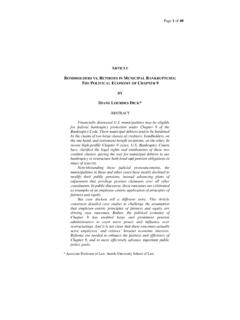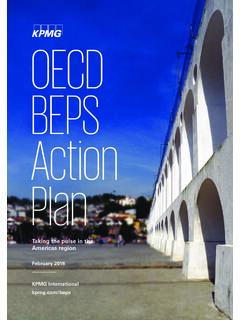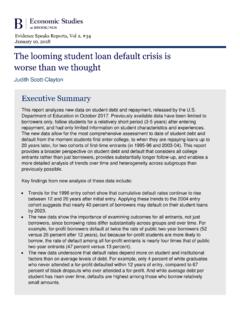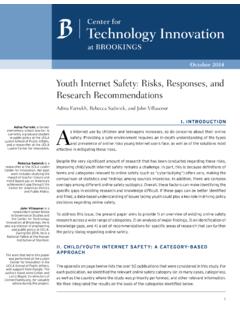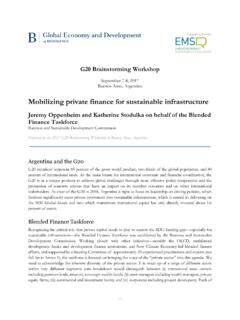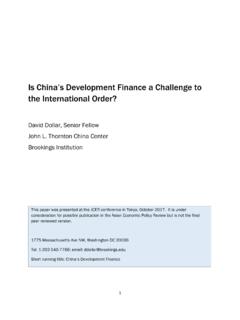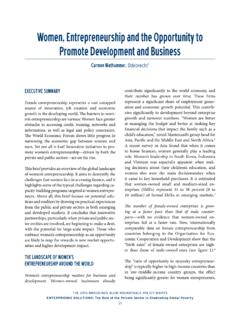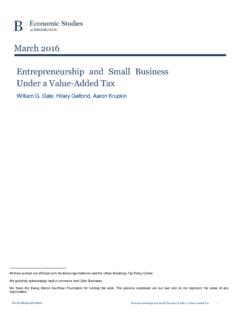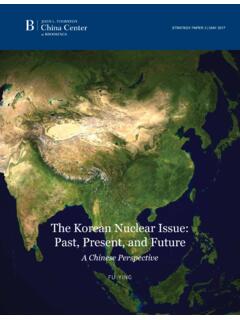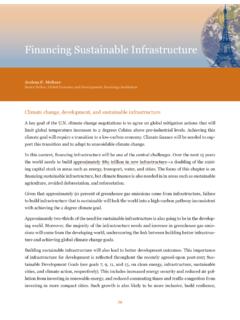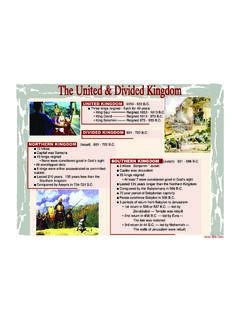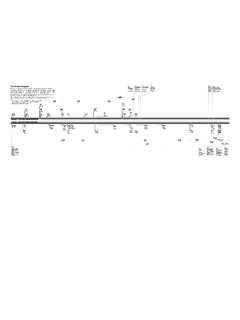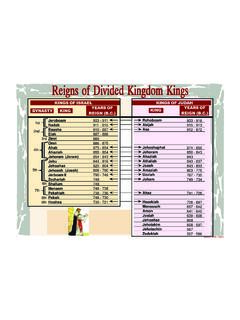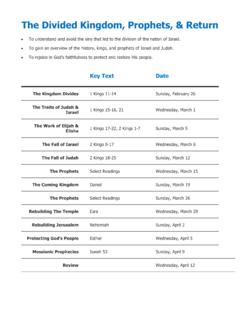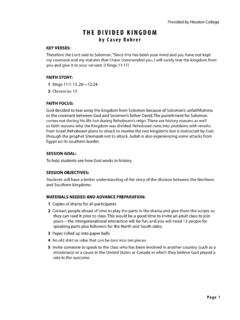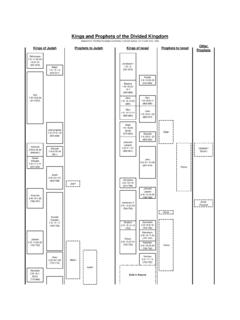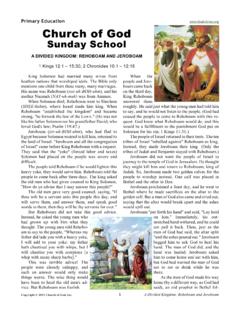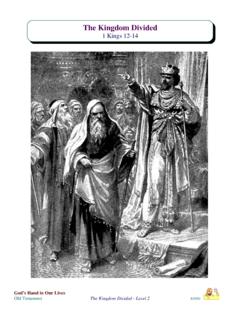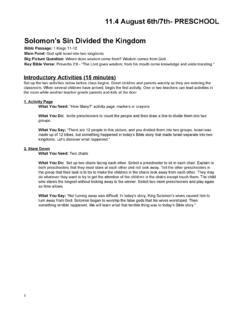Transcription of Divided kingdom: How Brexit is remaking the UK's ...
1 Divided kingdom : HOW Brexit IS remaking THE UK S CONSTITUTIONAL ORDER AMANDA SLOATBROOKINGS ROBERT BOSCH FOUNDATIONTRANSATLANTIC INITIATIVETHE NEW GEOPOLITICSEUROPEOCTOBER 2018 Foreign Policy at Brookings | 1 Divided kingdom : HOW Brexit IS remaking THE UK S CONSTITUTIONAL ORDER AMANDA SLOATEXECUTIVE SUMMARYIn June 2016, British voters decided in a referendum to leave the European Union, though clear majorities in Northern Ireland and Scotland preferred to remain. Amid the myriad complexities surrounding the terms of the divorce, the decision has strained the s constitutional arrangements. For example, will Scotland become independent? How would the return of a hard border on the island of Ireland affect the precarious peace there?
2 And could Brexit affect the s policymaking abilities and projection of unity on the international stage, given fights over where and how competences returned from the EU will be exercised in the Although these debates can look like British navel gazing, they have practical consequences for the United States and paper argues that Brexit will alter not one but two unions: the European Union and the United kingdom . It begins with an overview of the s constitutional arrangements, outlining how power has been devolved to the country s nations and regions. It then discusses how Brexit has challenged these structures, with a focus on Northern Ireland and Scotland.
3 Next, it considers how political dynamics in London, Dublin, Edinburgh, and Belfast are complicating efforts to resolve these tensions. Finally, it details how Brexit will affect Northern Ireland and Scotland in political and socio-economic terms, and force debates about unresolved identity issues and the nature of devolved | Foreign Policy at Brookings Divided kingdom : HOW Brexit IS remaking THE UK S CONSTITUTIONAL ORDERINTRODUCTION You will have noticed that we missed our landing given the fog. I had dozed off during the short flight from Edinburgh to Belfast. Awakened by the flight attendant s announcement, I looked out the window.
4 The plane was clearly descending, but only the Irish Sea was visible. We ll see what the pilot does, she added ambiguously. The cloudy and anxious landing was an apt analogy for the uncertainty I felt while traversing the United kingdom in the time of June 2016, British voters decided in a referendum to leave the European Union (EU) after over 40 years of membership. However, clear majorities in Northern Ireland and Scotland preferred to remain. Amid the myriad complexities surrounding the terms of divorce, the decision has strained the s constitutional arrangements. For example, will Scotland become independent? How would the return of a hard border on the island of Ireland affect the precarious peace there?
5 And could Brexit affect the s policymaking abilities and projection of unity on the international stage, given fights over where and how competences returned from the EU will be exercised in the paper seeks to provide context for understanding these questions. It begins with an overview of the s constitutional arrangements, outlining how power has been devolved to the country s nations and regions since the late 1990s. It then discusses how Brexit has challenged these structures, particularly in Northern Ireland and Scotland. Next, the report considers how political dynamics in the concerned capitals are complicating efforts to resolve these tensions.
6 Finally, it details how Brexit will affect Northern Ireland and Scotland in political and socio-economic terms, and force adjustments to the s domestic governance. It draws from interviews conducted in early May 2018 with more than 65 people (from government, political parties, think tanks, media, business, and civil society) in London, Dublin, Edinburgh, and paper concludes that Brexit will affect not one but two unions: the European Union and the United kingdom . As a study by the House of Lords Europe Committee in July 2017 found, The impact of withdrawal from the EU on the s devolution settlements is one of the most technically complex and politically contentious elements of the Brexit debate.
7 2 The elimination of EU laws that helped bind the country together, compounded by the current political climate, means that Brexit presents fundamental constitutional challenges to the United kingdom as a whole and requires the consent of all the nations of the for a durable solution. In the year since that study was published, the challenges have only grown. THE S ASYMMETRIC DEVOLUTION ARRANGEMENTSThe United kingdom of Great Britain and Northern Ireland is composed of four constituent parts: England, Wales, Scotland, and Northern Ireland. Their relationship with the government has evolved over time. Constitutional reforms in the late 1990s began a process of asymmetric devolution of power,3 while Brexit has created a new inflection point by re-opening unresolved identity and governance issues.
8 Northern Ireland The island of Ireland was Divided in 1921: the Republic of Ireland gained independence from the , while the six northern counties comprising Northern Ireland remained part of the union. The region s constitutional status has been contested between 2 | Foreign Policy at Brookings Foreign Policy at Brookings | 3 Divided kingdom : HOW Brexit IS remaking THE UK S CONSTITUTIONAL ORDERthe Protestant and predominantly unionist community, and the Catholic and largely nationalist community. This dispute led to decades of political turmoil and violence, often known as the Troubles, which cost over 3,600 April 1998 signing of the Good Friday Agreement/Belfast Agreement5 an international agreement between the British and Irish governments and a multi-party agreement in Northern Ireland provided a comprehensive approach to governance and civil rights.
9 It took constitutional debates off the table by declaring that Northern Ireland will remain part of the unless there is the consent of a majority of the people of Northern Ireland voting in a poll. 6 On the security side, the government reduced its military presence (including dismantling army posts, watchtowers, and checkpoints) and paramilitary groups decommissioned their weapons. The agreement created a 108-member assembly with a power-sharing executive to ensure representation of both unionist and nationalist communities in policymaking. It has full legislative and executive authority over transferred matters, which include all areas not retained by the the agreement, Northern Ireland slowly began moving in the right direction.
10 Its new assembly focused on routine issues of governance, notwithstanding periodic disagreements and trust deficits that stalled the formation of an executive and temporarily suspended the There was an influx of foreign investors, with Invest Northern Ireland counting nearly 900 international companies employing around 100,000 Relations also improved between the and Ireland, aided by the Agreement s creation of north-south institutions on the island and east-west (British-Irish) institutions that enabled cross-border coordination of policies (such as on agriculture and the environment). The EU membership of both the and Ireland made this fragile peace more viable by enabling connections and removing physical, economic, and psychological barriers.
